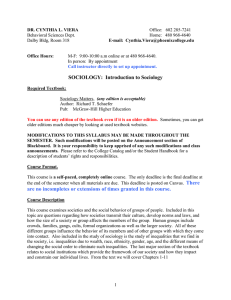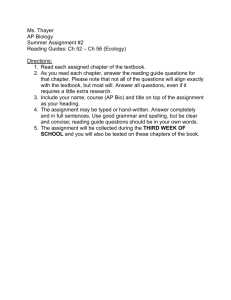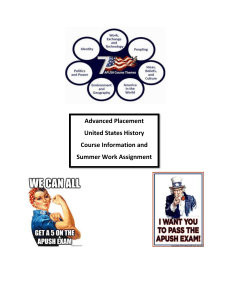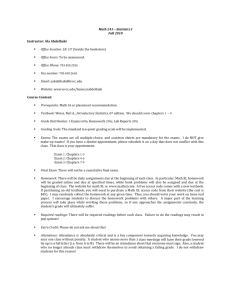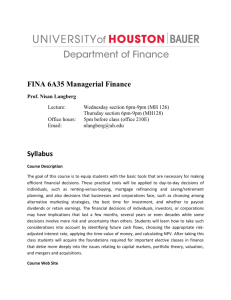SOC 251 Social Problems
advertisement
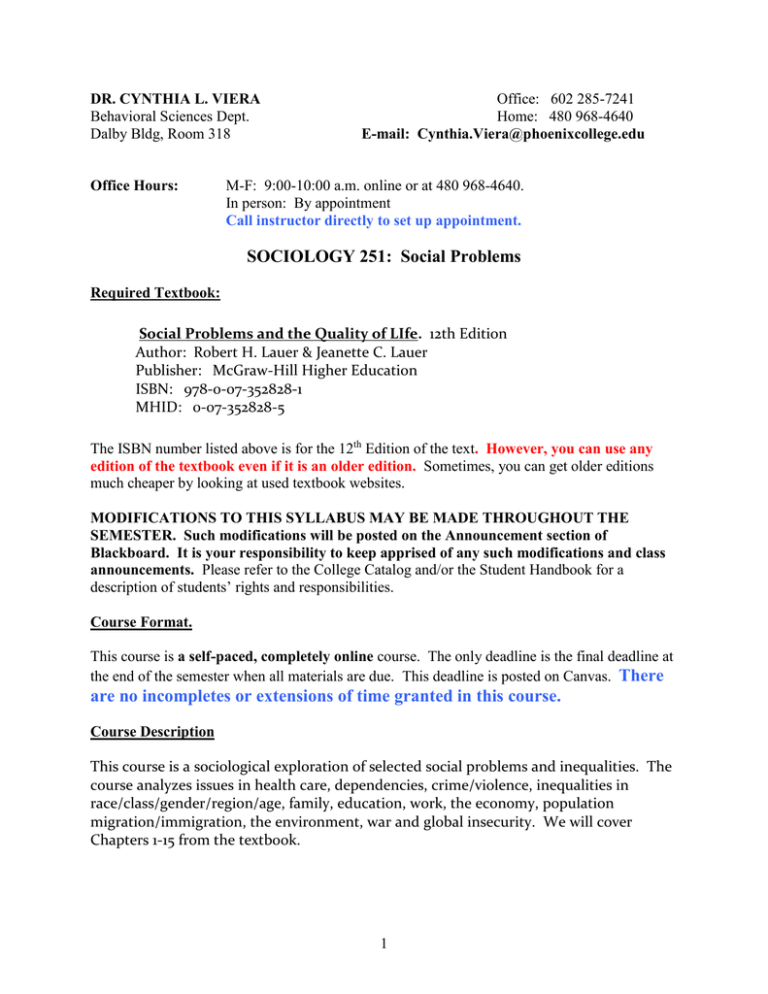
DR. CYNTHIA L. VIERA Behavioral Sciences Dept. Dalby Bldg, Room 318 Office Hours: Office: 602 285-7241 Home: 480 968-4640 E-mail: Cynthia.Viera@phoenixcollege.edu M-F: 9:00-10:00 a.m. online or at 480 968-4640. In person: By appointment Call instructor directly to set up appointment. SOCIOLOGY 251: Social Problems Required Textbook: Social Problems and the Quality of LIfe. 12th Edition Author: Robert H. Lauer & Jeanette C. Lauer Publisher: McGraw-Hill Higher Education ISBN: 978-0-07-352828-1 MHID: 0-07-352828-5 The ISBN number listed above is for the 12th Edition of the text. However, you can use any edition of the textbook even if it is an older edition. Sometimes, you can get older editions much cheaper by looking at used textbook websites. MODIFICATIONS TO THIS SYLLABUS MAY BE MADE THROUGHOUT THE SEMESTER. Such modifications will be posted on the Announcement section of Blackboard. It is your responsibility to keep apprised of any such modifications and class announcements. Please refer to the College Catalog and/or the Student Handbook for a description of students’ rights and responsibilities. Course Format. This course is a self-paced, completely online course. The only deadline is the final deadline at the end of the semester when all materials are due. This deadline is posted on Canvas. There are no incompletes or extensions of time granted in this course. Course Description This course is a sociological exploration of selected social problems and inequalities. The course analyzes issues in health care, dependencies, crime/violence, inequalities in race/class/gender/region/age, family, education, work, the economy, population migration/immigration, the environment, war and global insecurity. We will cover Chapters 1-15 from the textbook. 1 Withdrawal Deadlines You must log into the class by the last day of the first week of the semester at noon in order to avoid being withdrawn as a ‘no-show’. At any time prior to the week of finals, you may contact me if you wish to withdraw from the class. Assignments, Quizzes and Tests Modules. My online classes are organized in modules which correspond to each chapter in the book. The four major Exams are also found in a separate module following the chapters that are covered in the exam. You should begin each module by reading the corresponding chapter in the textbook. Study Lists. Each module contains a study list of terms that corresponds to the textbook chapter and the power points. Please find the definitions for the concepts as you are reading the chapter and viewing the power point presentations. You will not be required to turn in the study list. Rather, it is a guide for you to use to help you identify the important concepts and to use when you are taking the quizzes and exams.. Definitions can also be found in the companion website provided by the textbook publisher. The URL is listed below. This website contains a glossary of all terms in the text as well as chapter outlines or summaries. http://highered.mcgraw-hill.com/sites/0073528285/student_view0/ Power Point Presentations. Each module contains a power point presentation that corresponds to the chapter and contains information from the text as well as information from the instructor that may not be in the text. This would be equivalent to the information you would receive from in-person lecture sessions. You may view the power point presentations as many times as you wish. Assignments. Each chapter module will contain a 10-point assignment that relates to livestream video or a you-tube clip embedded in the assignment page. Most of these clips are short (less than 15 minutes). Each assignment usually requires a few sentences of discussion or short answers to questions relating to the videos. You can easily get all 10 points if you can show me that you have read and reflected on the video. In addition, you can resubmit any assignment as many times as you wish in order to get the full 10 points. Specific instructions are provided in each assignment. The 15 chapter assignments will be added together as one Exam grade based on 100 possible points. So if you complete them all, you can easily get 90-100 points for the overall assignment score. The intent of the chapter assignments is to provide some “real life” examples of what the chapters are talking about and to give you a chance to improve your overall grade. Quizzes. There is a 15-question quiz in each chapter module which you are required to complete. The quiz will have 15 questions that are true/false and multiple-choice. You will have 2 40 minutes to complete the quiz. Each question will be worth 6.67 points. If you are not satisfied with your score, you may retake any quiz as many times as you want. Only the highest scores of all attempts are retained for your grade. At the end of the semester the 15 quiz scores are averaged together and are included in your final grade as one exam score based on 100 possible percentage points. . Exams. After Chapters 4, 8, 12 and 15 there is a major exam worth 100 points each. You will have 90 consecutive minutes to complete each exam. You will have only two opportunities to take the major exams. I will retain the highest exam score of the two attempts. Each exam will consist of 50 multiple-choice and true/false questions from the textbook and from my power points. The chapters covered in each exam are as follows: Exam 1 Exam 2 Exam 3 Exam 4 Chapters 1-4 Chapters 5-8 Chapters 9-12 Chapters 13-15 There is no comprehensive final. Grade Breakdown There is no opportunity for extra credit. Final grades as based on the following breakdown of points: Assignments Quizzes 4 Major Exams 100 points 100 points 400 points Total Points: 600 points A's B's C's D's 540-600 points 480-539 points 420-479 points 360-419 points = = = = 90%-100% 80%-89% 70-79% 60-69% Contacting the Instructor Please contact me if you have any questions. You may call me at my home (480 968-4640) if it is before 10:00 p.m. My office number is listed on the first page of this syllabus. You may also send me an email. My email address is listed below. My online office hours are from 9:00-10:00 a.m. every day online or through my home phone. I am on campus in the afternoons but I may be in meetings. Therefore, if you would like to meet 3 with me in person, please call me and we can arrange a convenient time for you to visit me in my office. It is a pleasure to have you in my online class!! Dr. Cynthia Viera Cynthia.viera@phoenixcollege.edu Course Objectives: 1. Define primary and secondary groups in society and explain their significance. 2. Discuss the various types of love and the characteristics of healthy, intimate relationships. 3. Examine the family in terms of race and ethnicity. 4. Describe current social patterns in and sexual attitudes towards dating. 5. Discuss current interpersonal lifestyles including marriage and contemporary singles. 6. Examine the relationship between attitudes and behaviors, regarding sexuality. 7. Identify various marriage systems and the responsibilities, barriers and adjustments involved with each. 8. Identify the basic components of family structure and the values and determinants essential to creating a successful family unit. 9. Examine the issue of parenthood, including the roles of father and mother. 10. Identify leading causes of conflict and violence in relationships. 11. Discuss strategies for dealing with stress and violence in relationships. 12. Identify causes of separation/divorce and the effects on children and family members. 13. Describe characteristics and barriers common to remarriage families. 14. Examine the influence of gender roles in marriage and family relationships. 4
